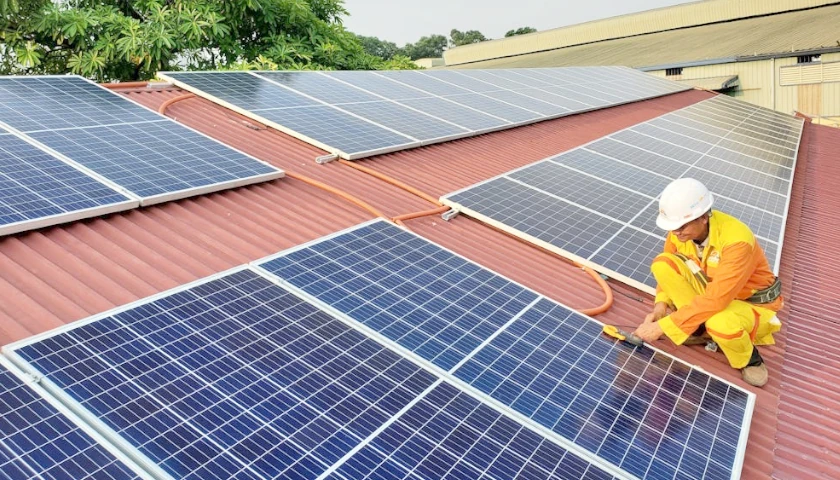by Gabriella Hoffman and Sarah Montalbano
Vice President Kamala Harris was “proud to cast the tie-breaking vote” for the Inflation Reduction Act. Would she be proud if her administration’s solar subsidies fund supported forced labor in China?
That may be the case with Hanwha Qcells, a South Korean solar company operating in Georgia. Bloomberg recently re
This month, the Energy Department issued the company — the top provider of U.S. residential and commercial solar panels — a $1.45 billion loan guarantee as part of the Biden–Harris “Investing in America” agenda. Harris visited the facilities in April 2023 and proclaimed “the panels being produced here are some of the best in the world.” Hanwha Qcells is expected to receive IRA green subsidies from American taxpayers totaling close to $10 billion through 2032, in addition to the Energy Department loan guarantee for its Georgia plant.
Harris would do well to remember the Solyndra debacle before conducting more PR trips to Hanwha Qcells. In 2009, President Barack Obama touted Solyndra as a hallmark of his stimulus bill and awarded it a $535 million Energy Department loan guarantee. Despite glaring red flags, in March 2010, Obama visited the company and lauded it for “leading the way toward a brighter and more prosperous future” for clean energy.
By Sept. 1, 2011, Solyndra failed, fired all of its employees, and filed for bankruptcy. Solyndra had a corruption problem: a top Obama fundraiser secured the $535 billion DOE loan guarantee while his wife’s firm, which represented Solyndra, received $2.4 million in federal funds for legal fees related to the DOE loan. The Biden–Harris administration hasn’t learned from former Obama’s past mistakes.
One of Hanwha Qcells’ biggest customers, SunPower, filed for Chapter 11 bankruptcy this month. SunPower also received an Energy Department loan guarantee from the Obama administration. In a 2023 Securities and Exchange Commission filing, the major rooftop installer confirmed it would be sourcing domestically assembled panels from Hanwha Qcells’ Georgia plant.
The bankruptcy of a major customer makes it seem that the Biden–Harris administration is carelessly doling out taxpayer money. And that money buys only hypocrisy. While the White House publicly vows to hold China accountable for forced labor practices, it turns a blind eye toward solar energy’s slave-labor problem in the Xinjiang Province.
The Uyghur Forced Labor Prevention Act (UFLPA), signed into law in late 2021, presumes that all goods originating from Xinjiang or any UFLPA-listed companies employ forced labor and are subsequently inadmissible into the U.S. marketplace. Bloomberg reports that the U.S. Customs and Border Protection, charged with enforcing UFLPA, has never detained a Hanwha Qcells product to verify they don’t contain forced labor, despite two suppliers sourcing polysilicon from companies featured on the UFLPA Entity List. Two of Hanwha Qcells’ sub-suppliers — TCL Zhonghuan Renewable Energy Technology Co. and Gokin Solar Co. — were listed by Customs and Border Protection as entities that wholly or partly produced or manufactured items with forced labor from Xinjiang.
Within 10 years, the IRA is expected to deliver between $1.2 trillion to $1.8 trillion in green subsidies to clean energy companies that can’t credibly compete in the free market. If all this taxpayer money buys is bloodstained polysilicon delivered to bankrupt companies, an American-driven clean energy revolution is doomed.
Bailing out solar energy with more IRA subsidies can’t keep this fledgling industry alive. The Biden–Harris administration would be wise to not put blind allegiance to net-zero policy ahead of respecting human rights.
– – –
Gabriella Hoffman is the director of the Center for Energy and Conservation at Independent Women’s Forum (iwf.org/CEC) and host of the District of Conservation podcast. Follow Gabriella on Twitter/X at @Gabby_Hoffman. Sarah Montalbano is a senior fellow with the Center for Energy and Conservation at Independent Women’s Forum (iwf.org/CEC), a StateBeat fellow with Young Voices, and a policy fellow at the Center of the American Experiment. Prior to joining American Experiment, she was an education policy analyst at Alaska Policy Forum. Follow her on X, formerly Twitter: @SarahMontalban0





